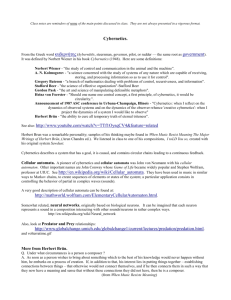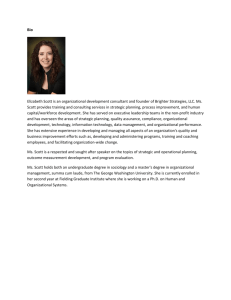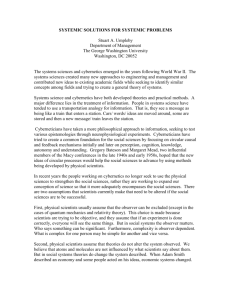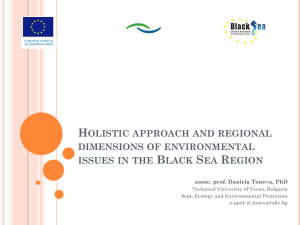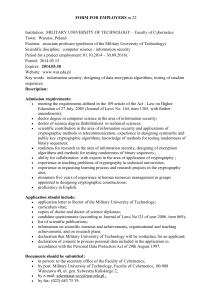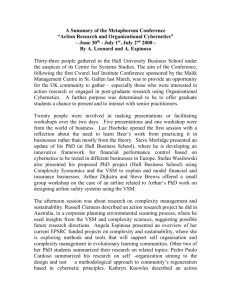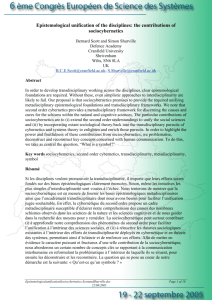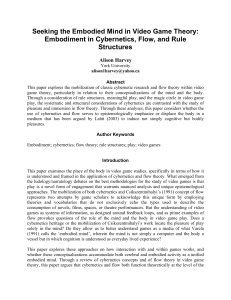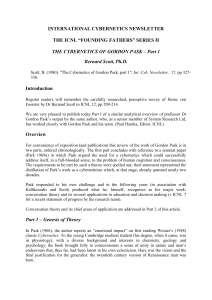DOC
advertisement
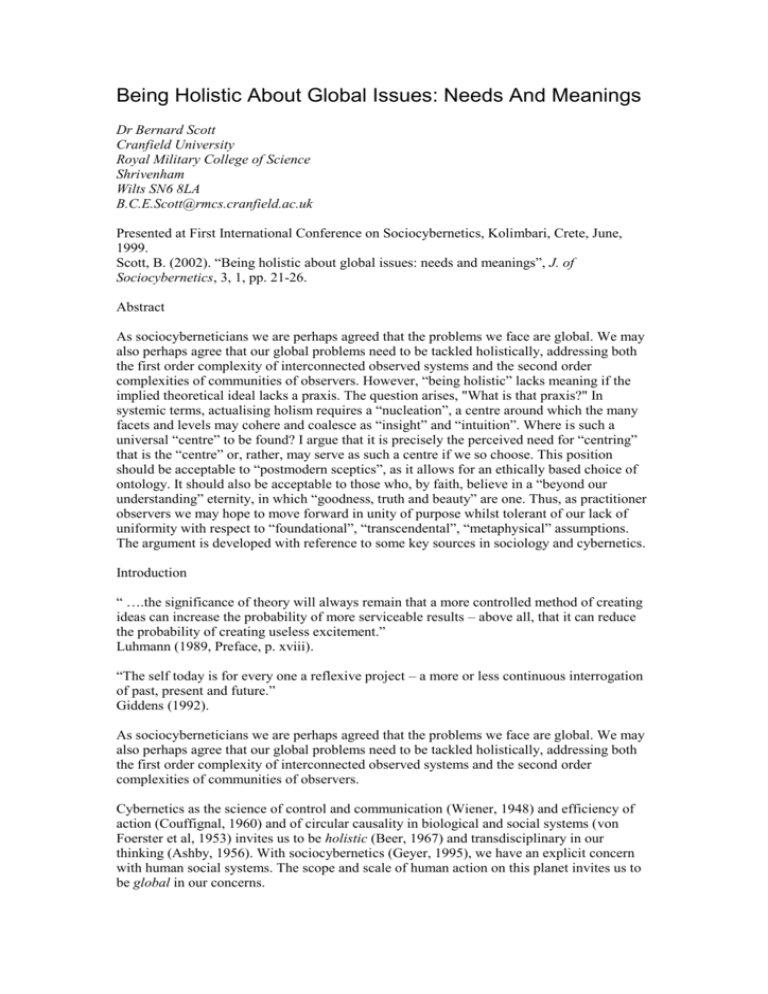
Being Holistic About Global Issues: Needs And Meanings Dr Bernard Scott Cranfield University Royal Military College of Science Shrivenham Wilts SN6 8LA B.C.E.Scott@rmcs.cranfield.ac.uk Presented at First International Conference on Sociocybernetics, Kolimbari, Crete, June, 1999. Scott, B. (2002). “Being holistic about global issues: needs and meanings”, J. of Sociocybernetics, 3, 1, pp. 21-26. Abstract As sociocyberneticians we are perhaps agreed that the problems we face are global. We may also perhaps agree that our global problems need to be tackled holistically, addressing both the first order complexity of interconnected observed systems and the second order complexities of communities of observers. However, “being holistic” lacks meaning if the implied theoretical ideal lacks a praxis. The question arises, "What is that praxis?" In systemic terms, actualising holism requires a “nucleation”, a centre around which the many facets and levels may cohere and coalesce as “insight” and “intuition”. Where is such a universal “centre” to be found? I argue that it is precisely the perceived need for “centring” that is the “centre” or, rather, may serve as such a centre if we so choose. This position should be acceptable to “postmodern sceptics”, as it allows for an ethically based choice of ontology. It should also be acceptable to those who, by faith, believe in a “beyond our understanding” eternity, in which “goodness, truth and beauty” are one. Thus, as practitioner observers we may hope to move forward in unity of purpose whilst tolerant of our lack of uniformity with respect to “foundational”, “transcendental”, “metaphysical” assumptions. The argument is developed with reference to some key sources in sociology and cybernetics. Introduction “ ….the significance of theory will always remain that a more controlled method of creating ideas can increase the probability of more serviceable results – above all, that it can reduce the probability of creating useless excitement.” Luhmann (1989, Preface, p. xviii). “The self today is for every one a reflexive project – a more or less continuous interrogation of past, present and future.” Giddens (1992). As sociocyberneticians we are perhaps agreed that the problems we face are global. We may also perhaps agree that our global problems need to be tackled holistically, addressing both the first order complexity of interconnected observed systems and the second order complexities of communities of observers. Cybernetics as the science of control and communication (Wiener, 1948) and efficiency of action (Couffignal, 1960) and of circular causality in biological and social systems (von Foerster et al, 1953) invites us to be holistic (Beer, 1967) and transdisciplinary in our thinking (Ashby, 1956). With sociocybernetics (Geyer, 1995), we have an explicit concern with human social systems. The scope and scale of human action on this planet invites us to be global in our concerns. Being holistic As noted, holism implies being transdisciplinary (I use the prefix “trans” to imply both meta and interdisciplinarity). As a cybernetician/systems theorist, one is not “a political scientist”, “an economist” “a social psychologist”, “a sociologist”, “an ecologist” or “a meteorologist” only, one is all of these. Theoretically we may distinguish first and second order concerns. First order cybernetics distinguishes, observes, measures and predicts the behaviour of observed systems. Second order cybernetics adds to that a concern with how observers distinguish themselves and their worlds and how they as, actors, interact in order to bring forth and maintain “forms of life” (Wittgenstein, 1953; Margolis, 1989). The cybernetician accepts explicit reflective recognition that second order cybernetics is reflexive - that he or she is just such an actor and, as such has responsibility for the worlds he or she brings forth . First order methodology explicitly recognises similarities and differences between disciplines – all are concerned, in one way or another, with distinguishing and measuring systems. Second order methodology reminds us that each discipline has brought forth a world, a “universe of discourse”, with metaphysical assumptions, theoretical and methodological paradigms, values and goals. It works to bring practitioners together as reflective practitioners, ready to question disciplinary assumptions (to take risks), to look for new insights and problems to be solved in the “interstices” and “overlaps” of disciplines. We should be proud there are examples of this (cf. several papers presented in the RC51 Montreal symposium, 1998). Methodologies also include the explicitly second order and qualitative approaches of discourse analysis that may reveal (often habitual) relations of power embedded in the form as well as the content of discourse (v. Ahlemeyer, 1997) and associated pathologies of communication in human systems (Scott, 1997). Being global Being global means being concerned for the whole planet – what is happening? What may happen? Epistemologically what does it mean to ask such questions? What answers might we expect? There are two key inter-related issues: (i) sustainable development (largely a set of first order question about system measurement and performance); (ii) maintaining and improving the right of actors to interact – mainly second order concerns with “human rights”, “democracy” and “justice” Many commentators insist (i) is meaningless without (ii). Here I distinguish them for purposes of discussion. For (i) there is a logic that says “We should be humble as part of a larger whole that is unfolding despite our actions”, by, for example, paying attention to Barry Commoner’s “four laws of ecology” (“everything is connected to everything else; everything has to go somewhere; there’s no such thing as a free lunch; nature knows best”). Complex systems may be modelled in a variety of ways. We may “locally” foresee the consequences of negative and positive feedbacks on a particular subsystem’s variables (monetary markets, global warming, population levels, levels of poverty and literacy) but we need to improve and integrate our models so they are more global in scope and do include second order effects of “agents’” actions, as in the economic modelling of Brian Arthur and John Holland, where account is taken of the fact that 98% of all financial transactions are speculations by agents about other agents’ behaviours. For (ii), there is a logic that says “non-democracies” are “social cancers” and that “justice” should be universal and be suitably empowered, together with checks and balances to reduce the risk of the imposition of totalitarian regimes. “The right of actors” to interact implies that access to education and information should be universal – to participate fully members of a society need to be empowered (Pask, 1991). There is a need for the continuous critique of institutions (political, business, educational), a continuous “revolution in the revolution” – not so much to discover new wisdom but perhaps to ensure the light of existing wisdom (Cybernetics and before – Confucius, Buddha, Christ, Marx) is maintained and allowed to bear fruit (Scott, 1999a; Birrer’s paper, this conference). Although I am arguing for a consensus view, there is scope for “agreement to disagree”. I am referring to disagreements about certain “undecideables” (von Foerster, 1993) to do with life, death, time and eternity, good and evil. I argue it is possible for us to tackle global issues holistically, despite such disagreements. Being holistic and global With respect to the need to be both holistic and global, Luhmann (1989) very clearly warns of two dangers: (i) failure to “resonate” with the ecosystem (not being global enough in our concerns); (ii) too much resonance between social systems (not being holistic enough to dampen unfruitful noise and “excitement”). Examples of (i) are many: being parochial with respect to one’s own ecological niche; focussing on one issue (e.g., “global warming” or “poverty”) but not taking cognisance of related issues (e.g., “opportunities for education” or “political freedoms”). Examples of (ii) are also many: the promotion of one scientific discipline over another; the promotion of one political ideology over another. There is then an open invitation for all of us to be less parochial and more global in our concerns and interests. There is a need to listen to other voices, with an honest heart and an open mind. However, holism is called for if we are not to be overwhelmed by noise and excitement. As noted earlier, the phrase “being holistic” refers to the need for transdisciplinary tools and understandings that can facilitate effective interdisciplinary working. There are two problems to be addressed and for which this paper proposes solutions: 1. “being holistic” lacks meaning for an individual if the implied theoretical ideal lacks a praxis; 2. the concept lacks consensual meaning if the praxis is not in some sense one that sociocyberneticians, as actors, may agree to apply together, in concert. The question arises, "What is that praxis?" (cf. Heidegger, 1978: “Perhaps there is a thinking which is more sober minded than the incessant frenzy of rationalisation and the intoxicating quality of cybernetics....a thinking outside of the rational and the irrational... The task of thinking would then be the surrender of previous thinking to the determination of the matter for thinking”). In systemic terms, actualising holism requires a “nucleation”, a cognitive/affective centre around which the many facets and levels of our concerns may cohere and coalesce as insight and intuition (Capra, 1982), as a pragmatically “true”, coherent conceptual system or system of beliefs (Rescher, 1973, 1977; Scott, 1999b), as an organisationally closed “psychological (p-) individual” (Pask, 1975, 1981) (see figure 1). Where is such a universal “centre” to be found? I argue that it is precisely the perceived need for a holistic “centring” that is the “centre” or, rather, may serve as such a centre if we so choose. That is, as practitioners it is sufficient to intend to be holistic – and to share that intent - in order for ideas to be created fruitfully. Concluding Comments The theoretical position advanced in this paper should be acceptable to “postmodern sceptics” and “nihilists”, as it allows for an ethically based choice of ontology, without the explicit imposition of a consensual morality (cf. Luhmann, 1989, on the dangers of moral coding and the risk that “all ethical reflections may fail”). It should also be acceptable to those who, by faith, believe in a “beyond our understanding” eternity, in which “goodness, truth and beauty” are one. Thus, as practitioner observers we may hope to move forward in unity of purpose, practising “technologies of the self” (Foucault, 1972; Giddens, 1992) and “cognitive methodologies” (Scott, 1983, 1996), whilst tolerant of our lack of uniformity with respect to “foundational”, “transcendental”, “metaphysical” assumptions. References Ahlemeyer, H. W. (1997). “Observing observations empirically: methodological innovations in applied sociocybernetics”, Kybernetes, 26, 6/7, pp. 641-660. Ashby, W.R., (1956). Introduction to Cybernetics, Wiley, New York. Beer, S. (1967). Decision and Control, Wiley, New York. Birrer, F (1999). “From natural sustainability to social sustainability”, abridged paper for ISA RC51 conference, Kolimbari. Capra, F. (1982). The Turning Point, Wildwood House, London. Couffignal, L. (1960) “Essai d’une definition generale de la Cybernetique”, in Proceedings of the Second Congres Foucault, M. (1972). The Archaeology of Knowledge, Tavistock, London. Geyer, F. (1995). The Challenge of Sociocybernetics, Kybernetes, 24, 4, pp.6-32. Giddens, A. (1992). Transformation of Intimacy, Polity Press, Cambridge. Heidegger, M. (1978). “The end of philosophy and the task of thinking”. In Martin Heidegger: Basic Writings, D. F. Krell (ed.), Routledge, London. Luhmann, N. (1989). Ecological Communication, Polity Press, Cambridge. Margolis, J. (1989). Texts Without Referents: Reconciling Science and Narrative, Blackwell, Oxford. Pask, G. (1975). Conversation, Cognition and Learning, Elsevier, Amsterdam, 1975. Pask, G. (1981). “Organisational closure of potentially conscious systems”. In Autopoiesis. M. Zelany, Ed.: 265-307. Pask, G. (1991). "The right of actors to interact: a fundamental human freedom", in Glanville, R. and de Zeeuw, G. (eds.) Mutual Uses of Cybernetics and Science (Vol 2), Systemica, 8, 1 to 6, Thesis Publishers, Amsterdam. Rescher, N.(1973). Conceptual Idealism, Basil Blackwell, Oxford. Rescher, N. (1977). Methodological Pragmatism, Basil Blackwell, Oxford. Scott, B. (1983). "Morality and the Cybernetics of moral development", Int. Cyb. Newsletter, 26, 520-530. Scott, B. (1996) “Second order cybernetics as cognitive methodology”, Systems Research 13, 3, pp. 393-406 (contribution to a Festschrift in honour of Heinz von Foerster). Scott, B. (1997). “Inadvertent pathologies of communication in human systems”, Kybernetes, 26, 6/7, pp. 824-836. Scott, B. (1999a). “Forgetting in self-organising systems”, in The Evolution of Complexity, F. Heylighen (ed), Kluwer, Dordrecht (in press). Scott, B. (1999b). “Conceptual coherence and organisational closure”, Annals of the New York Academy of Sciences (in press). Von Foerster, H., Mead, M., and Teuber, H. L. (1953). Cybernetics: Circular Causal and Feedback Mechanisms in Biological and Social Systems, Josiah Macy, Jr. Foundation, New York. Von Foerster , H., (1993). “Ethics and second order cybernetics”, Psychiatria Danubia, 5, 12, pp. 40-46. Wiener, N., (1948). Cybernetics, Wiley, New York, 1948 Wittgenstein, L. L. (1953). Philosophical Investigations. Basil Blackwell, Oxford. Why? Me ta ph ysi ca l a ssump tio ns T he oreti ca l i nte rp retati on s Con cep tua l syste ms How ? Mo de ls Me th od s Pro ce du re s App li ca tio n Pra gm ati c correcti o n Correcti on by co he ren ce 2. A Re“system sc he r’s of “twbeliefs” o-c ycle(after ” model of lea rning Figure 1. Rescher)
